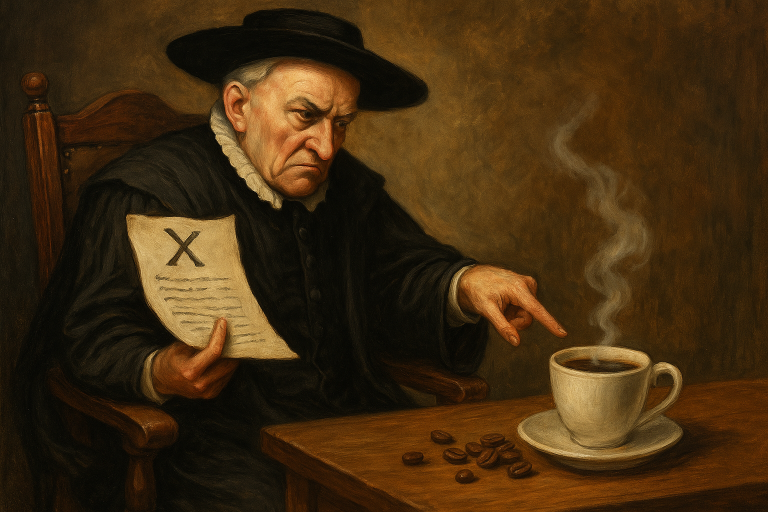
Throughout history, coffee has been more than just a beverage—it has served as a spark for intellectual discourse, political organization, and social revolution.
From Enlightenment salons to anti-colonial gatherings, this humble drink has consistently found itself at the heart of transformative moments in history.
In this article, we explore how coffee and coffeehouses have fueled revolutions—not just in thought, but in action.
When coffee first reached Europe in the 17th century, it didn’t just introduce a new flavor to the continent. It introduced a new way to socialize, discuss, and challenge ideas.
Before coffee, alcohol was the most common social beverage. Coffee’s stimulating effects gave rise to a new kind of space: the coffeehouse—an environment where people gathered to think, not just drink.
These establishments were nicknamed “penny universities” in England, as patrons could buy a cup of coffee and enjoy debates on philosophy, science, and politics—essentially getting an informal education for the price of a beverage.
Coffeehouses became the physical infrastructure for intellectual revolution—places where thoughts could ferment into movements.
The Enlightenment period in Europe (17th–18th centuries) was marked by an explosion of rational thought, scientific inquiry, and critiques of established authority. Coffeehouses played a central role in this intellectual awakening.
In France, cafés in Paris hosted discussions that would influence revolutionary thinking. Writers like Voltaire, Rousseau, and Diderot were known to frequent cafés where ideas for works like the Encyclopédie were refined.
In England, coffeehouses in London such as Lloyd’s became not just meeting places but the birthplaces of institutions like Lloyd’s of London insurance and even The Royal Society.
Coffee fueled the minds that questioned monarchies, proposed democratic ideals, and shaped the modern Western world.
In pre-revolutionary America, coffee became a symbol of independence and rebellion. After the Boston Tea Party in 1773, drinking tea was viewed as unpatriotic because of its connection to British taxation. As a result, coffee consumption surged as an act of protest.
American colonists met in coffeehouses to:
One such meeting place was Merchant’s Coffee House in Philadelphia, where plans for the Continental Congress were reportedly discussed. In this context, coffee wasn’t just a drink—it was a revolutionary statement.
By the late 18th century, Parisian cafés had become epicenters of revolutionary thought. Citizens from all classes gathered to read newspapers, engage in debates, and challenge royal authority.
The iconic Café Procope, founded in 1686, was a haunt for Robespierre, Danton, and other leaders of the French Revolution. These cafés offered a rare space where commoners, intellectuals, and aristocrats could mingle—breaking down social hierarchies in ways that foreshadowed the political revolution itself.
Coffeehouses helped distribute revolutionary literature and news, making them vital tools in the dissemination of political ideas. Without cafés, the French Revolution might have unfolded more slowly—or differently.
As coffee cultivation expanded under European imperialism, especially in Africa, Asia, and Latin America, it became both a symbol of exploitation and a site of resistance.
Ethiopia, the birthplace of coffee, was one of the few African countries to resist colonization. While coffee was a major economic crop, local customs and ceremonies also preserved it as a cultural treasure—not just a commodity.
Coffee gatherings were moments of unity and planning, especially during times of political struggle.
In pre-revolutionary Cuba, coffeehouses and cafés in Havana became popular meeting points for students, labor leaders, and intellectuals opposed to the Batista regime. Conversations over coffee helped shape the rhetoric and strategies of resistance that would eventually lead to Castro’s revolution.
In India, where tea is more dominant, coffee still played a role in revolutionary discourse—especially in the south, where Tamil Nadu and Karnataka housed intellectual communities. Indian Coffee Houses, run by worker cooperatives, became safe havens for political activists, communists, and artists during the 20th-century struggle for independence and post-independence reforms.
These cooperatively run cafés are still in operation today, continuing their legacy of serving as platforms for free expression.
In the 1950s and 60s, cafés once again served as hubs of resistance—this time in the American South.
African-American-owned cafés and diners were often used as:
Coffee became part of a new revolution—not of governments, but of social equality and justice.
Today, cafés and coffee culture continue to shape movements, albeit in more digital and decentralized ways.
In cities around the world, independent cafés host:
Unlike big-chain coffee shops, these venues often serve as cultural incubators for grassroots change.
The internet has created a new type of revolution—hashtag movements, digital boycotts, and awareness campaigns—and coffee has often been at the center.
Movements like:
…illustrate how coffee culture intersects with labor rights, racial justice, and ethical consumption.
What makes coffee such a catalyst for revolutionary thought?
In short, coffee fosters the ideal conditions for thinking—and challenging the status quo.
From 17th-century Enlightenment thinkers to 21st-century activists, coffee has been a constant companion in the pursuit of justice, freedom, and truth. It has fueled revolutions both ideological and structural, offering a space for people to gather, plan, and act.
So the next time you sip your coffee in a quiet corner of a café, consider this: you’re sitting in a space that has, time and again, hosted the conversations that changed the world. Coffee isn’t just a drink—it’s a tool of transformation.

Gabriel Rodrigues é especialista em finanças pessoais e escritor, com ampla experiência em economia, planejamento financeiro e gestão de recursos. Apaixonado por ajudar as pessoas a alcançarem sua saúde financeira, ele explora temas variados, desde investimentos até estratégias de poupança. Quando não está escrevendo, você pode encontrá-lo estudando novas tendências financeiras e oferecendo consultoria para quem busca melhorar sua relação com o dinheiro.